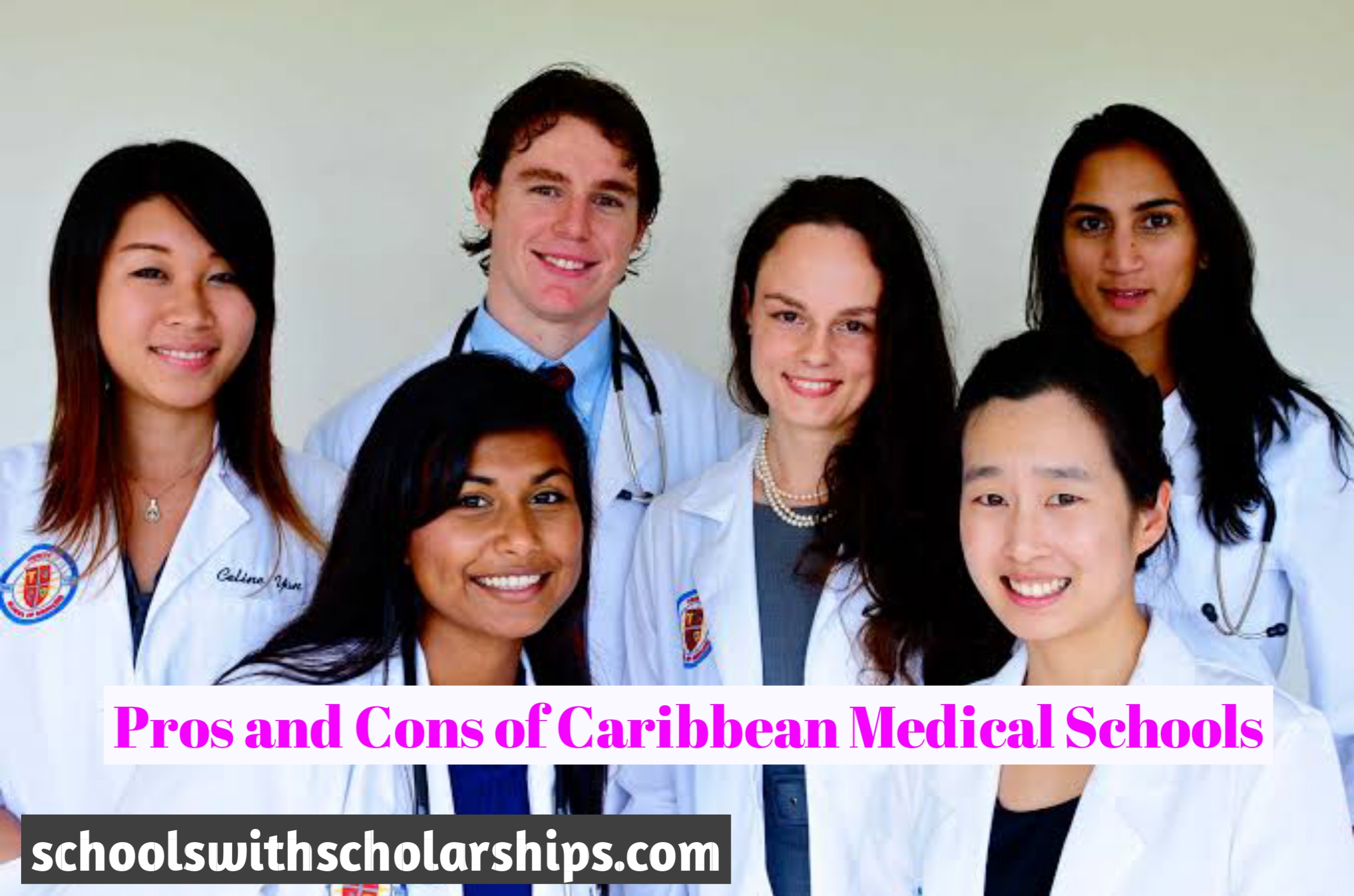Pros and Cons of Caribbean Medical Schools : Top Reasons You Should Consider Going To These Caribbean Med Schools Quickly In 2021
What are the pros and cons of Caribbean medical Schools? Why should I attend Caribbean medical Schools? Is there any benefit of studying in Caribbean medical Schools? These and more questions will always come to mind when trying to select the best medical School for you.
It is a simple fact that numerous prospective medical students struggle to find the right medical school that suits their skills, talents and specialization. However, they tend to find the medical school that will give them the most benefit in regards to academics and experience. Many medical schools around the world have promising offers that will earn you a medical degree with several benefits.
One place that many medical students want to apply to is the Caribbean. Not only are there many medical schools to choose from, but there are also various specializations which is why we need to know the pros and cons of Caribbean medical schools
Contents
Quick Read.
- What are the easiest scholarships to get for international students?
- Big Four Caribbean Medical Schools
- When should I expect my financial aid refund check?
- Top 10 Medical Schools in England 2021
- Top Ranking Boarding Schools in Illinois
- 2021/22 Canada Commonwealth of Independent States (CIS) Scholarships – Apply Now
Furthermore, many students, most especially international students, have no personal experience studying medicine in the Caribbean. They don’t know how they will act other than medical school, environment, people, and culture they are not used to. You will wonder if they can adjust and get used to life in the Caribbean with the active pressure of completing their medical degree successfully.
Yes, some qualities and advantages can only be offered in the Caribbean, but are the demerits that can come with good things worth it, is it worth the pain and the awkward experience most times?
To help these students choose and decide to study medicine in the Caribbean, this article gathers information on the pros and cons of studying medicine in the Caribbean. This guide will help students assess and weigh the pros and cons of studying and living in the Caribbean while studying medicine peacefully and in-fact with fun.
But, In the recent years, it has end up being very difficult to acquire entrance into a United States medical school. Passing by insights, only 19,517 out of the absolute 45,266 candidates to a solitary medications school were conceded in 2012. That means an astounding 57% of dismissed applications. With the numbers so high, numerous young men and ladies who seek to become medical experts have been locked out.
Accordingly, the majority of these dismissed candidates go to the Caribbean medical schools briefly opportunity to seek after the medical profession. In any case, many are left considering what the results of going to an unfamiliar clinical school would be. Thus, this article will zero in on illustrating the pros and cons of the Caribbean medical schools.
Read Also: Top medical Schools in Cuba
Caribbean Medical Schools
Caribbean medical schools can also be named as offshore schools, and they are medical schools geologically situated in the Caribbean. Most exist mainly to prepare medical students from the U.S. who plan to ultimately coordinate into residency and practice in the U.S.
Most Caribbean clinical school programs are seen or considered as “double grounds” programs, which essentially implies that the fundamental parts of medical sciences are concentrated in the Caribbean, while the resulting clerkships and clinical turns are done at emergency clinic offices in the U.S.
Pros and Cons of Caribbean Medical Schools
For better or for worse, some of these traits are must-haves if you plan to study medicine in the Caribbean. Of course, this mainly depends on the student’s perspective, experience and wishes about what, in his opinion, is appropriate to live in the country of study for this degree.
Some of the qualities that some students consider are lifestyle, whether the environment or community is good for their well-being, the lifestyle and culture of the locals which may surprise them, unusual weather, maybe new faces, unknown ways.
These are some of the things that many students, especially Caribbean residents, will experience on a daily basis while in the country. So, here are some of the pros and cons of caribbean medical Schools that most other students usually consider good or bad.
Pros of Studying Medicine in the Caribbean

1. Excellent Climate
Based on climate, the Caribbean is a particularly cool spot to be. You’ll encounter the warm tropical climatic conditions lasting through the year. You will not need to stress over all the shuddering and the snow we face during winter. However, I need to accept that it is absolutely impossible that this would be your lone justification going to a Caribbean medical school.
2. Higher Chances of getting accepted
The normal MCAT and GPA cut-off mark for almost all medical schools in the United States are 31 and 36, individually. Then again, the normal MCAT and GPA for admission in the Caribbean medical schools are way lower. This is normally why most prospective students with disappointing MCAT and GPAs see Caribbean schools as an alternative since their grades have no shot at D.O. or then again M.D. schools in the U.S
3. International Medical Training
In the worldwide society we live in today, students who figure out how to secure worldwide medical examinations partake in an extraordinary benefit while rehearsing as doctors and while applying for residency. The way that some Caribbean clinical schools are firmly associated with various showing medical clinics implies the students have a chance to partake in clinical revolutions in the U.S.
Some Caribbean schools exceed everyone’s expectations to offer their students medical revolutions across the globe.
4. Easier process of admission
It’s anything but confidential to everybody that the process of admission or getting into medical schools in the Caribbean is generally a lot simpler contrasted with different countries and continents. There are a few explanations behind this ace of Caribbean clinical schools, particularly for those whose skills and luck for entering medical schools are moderately low.
Medical schools in the Caribbean have extremely low, if not, none by any stretch of the imagination, Medical College Admission Test (MCAT) score necessity that pretty much every clinical school all throughout the planet has. The greater part of the medical schools in the Caribbean accept that this assessment before really getting into medical school has neither rhyme nor reason since what they are assessing is raw information that doesn’t have a solid establishment of the examinations identified with medication.
This is the motivation behind why most of clinical schools in the Caribbean don’t expect understudies to take the MCAT. Notwithstanding, they are still allowed to do as such and submit it with their prerequisites despite the fact that it won’t be a factor on the off chance that you will be acknowledged or not in clinical school.
5. Clinical Rotations In The United States
Some Caribbean medical schools will offer clinical revolutions in the United States for fourth and third year students. In case you are thinking about practising medicine in the United States, you ought to pick a Caribbean school that offers these professions.
Graduating with a degree from a Caribbean school that doesn’t concede these revolutions would be absolutely useless in light of the fact that you can’t practice in the U.S. At the point when you do your clinical rotations in the United States, you have better pursues while applying for residency in the country.
6. Rolling Admission
Unlike medical schools in the United States, attending a Caribbean medical school allows you to apply at any time during the school year and you can become an adult soon after.
This is a great professional because it gives you the opportunity to start studying medicine right away, even for those waiting to hear about the American school they are applying to. pros and cons of caribbean medical schools in Nigeria
7. Early Clinical Experience
Most Caribbean clinical Schools offer their students both old and new a chance to begin creating clinical expertise and skill right off the bat in the learning curriculum. Then again, medical schools in the United States will put this off till later in the preclinical educational plan or altogether pass on it to the clinical. By early openness to the clinical settings and experience, students become more ready to put the clinical information procured during Preclinical Sciences into application when in clinical turns.
Cons of Studying in Caribbean Medical Schools

1. Inconsistent Quality
With over 60 Caribbean medical schools, the quality can vary. Unlike American medical schools that offer LCME-accredited Master’s degrees, the accreditation standards for Caribbean schools are less stringent, less stable, and less standardized.
Some Caribbean schools give very good results and get high results with their students. This small percentage of committed schools have student outcomes with more than 95% USMLE Step 1 scores and a high match rate on residency programs in the United States. pros and cons of caribbean medical schools 2021
However, other schools sign up for UCMLE Step 1 at only 19% and a terrible match rate at home.
2. No Guarantee About You Becoming A Doctor
The National Resident Matching Program reports that half of graduates from the Caribbean medical institution match into residencies in the U.S. The clear best Caribbean clinical school has a 70% match rate, while in examination, 79% of U.S. osteopathic graduates match and 90% of U.S. Allopathic alumni also.
When taking a gander at the numbers in the troubling light of the significant expense of Caribbean schools, you will before long acknowledge you are paying such a lot of cash for something was a long way from sure.
3. High Tuition Cost and Debt Burden
You will find Caribbean medical schools that already promise state funding for students. This means that students collect a large amount of student loans, around $200,000. When that knowledge is combined with the fact that graduates are less likely to get a place in competing courses, one quickly realizes that going to the Caribbean medical school on student loans can be a financially risky option.
You should also keep in mind that studying in the Caribbean medical schools is more expensive. Most of these medical schools are private, and tuition fees are higher than the average American medical school.
This means that after you graduate, there are still years before you try to pay back your student loans. USMGE, the dormitory funder, has not increased the number of living spaces in years. You want to bet that early in your career, you don’t want to see unemployment and unpaid student loans.
4. High competition
We can define a base boundary and say that the vast majority of these unfamiliar schools are less worried about their students prosperity and are more arranged towards the cash printing business. Some won’t feel the squeeze when enlisted student drop out, so long as they brought in cash from the students.
After joining a Caribbean medical school, you should contend overwhelmingly and stay at the highest point of your class for your degree certificate to be essentially commendable. Put in less complex terms, you should score high on USMLE Step 1 for you to compensate for the way that you graduated from a Caribbean school.
In any case, even subsequent to investing in this load of amounts of energy, you will in any case be restricted in the residency alternatives.
5. Limited Access To Residency
While attending Caribbean medical school, you will have serious disabilities, especially if you are interested in highly competitive specialties such as head and neck surgery, urology, plastic surgery, dermatology, radiation oncology, orthopedic surgery, and more.
This Caribbean medical school graduate admitted to experiencing the heat of competition. Despite his bias, he talks about his challenging journey and futile attempts to incorporate orthopedic surgery. This is despite the fact that it has great results and a great resume. pros and cons of caribbean medical schools 2021
It is important to note that some Caribbean schools hide their match lists and if your target school does, it will have a big red flag.
6. No Guarantee About Becoming A Doctor
The National Population Match Program reports that 50% of Caribbean medical school graduates live in the United States. Obviously, the best Caribbean medical schools have a 70% match rate, compared to 79% of American osteopathy graduates and 90% of US pathological graduates.
If you look at the numbers in the dark light of the high cost of Caribbean schools, you’ll quickly find that you’re paying so much money for something that’s far from safe.
7. Unquestionable Stigma
While it would be more acceptable to graduate from a Caribbean medical school today, with few students being accepted into medical schools in the United States, most residency programs, especially those with competitive majors, refuse to accept or support Caribbean graduates. This form of rejection often stigmatizes these graduates.
However, if you want to work as a primary healthcare provider, you won’t face this challenge, but if you want to connect to a highly competitive area, securing housing can be an even bigger challenge.
8. Familiarity with Universities & Programs
While many, if not most, North American students attend universities that are not located near where they live, most of them still enrol in schools in their home countries. They are usually very familiar with the school and program for which they are applying and may even have relatives or acquaintances who have attended. If you decide to study in the Caribbean, you may not be very familiar with the university to choose from or you may know everyone who has attended.
Conclusion
After going through the pros and cons of Caribbean medical schools, do you still want to attend the school or quit aspiring to be a student of the medical school?
The medical institute is for sure one of the best school anybody can talk about in the line of medicine. pros and cons of caribbean medical schools 2021

